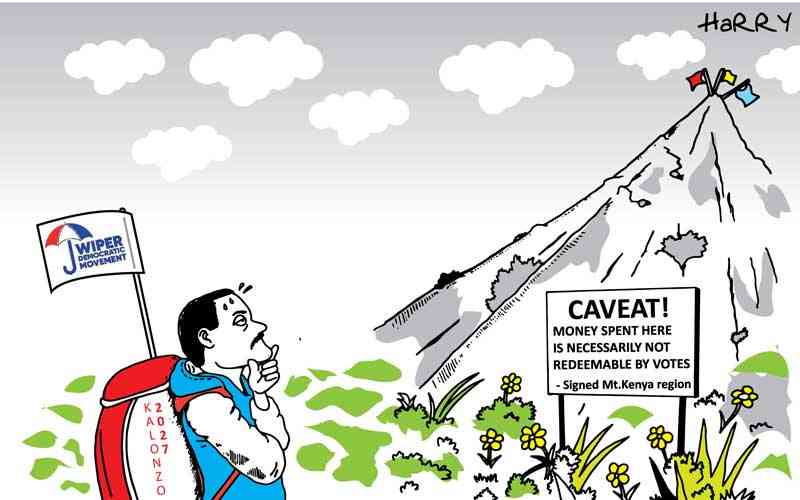Allow me an extra week of optimism for Kenya. Let me refuse to be distracted by the bad habits of some of our leaders who can’t see a piece of public land without privatising it. Others have taken a break from decency and bully and brawl like village drunks.
My optimism has soared after I read a story in the dailies, (unfortunately our papers tucked it away in the back pages towards the obituaries) about the ranking of Kenya amongst seven most promising economies. The story was a review of an article titled The new world of business, carried by the influential Fortune magazine. Its content should cause the numerous “Kenya skeptics” who straddle the entire political, social and economic sectors, to pause and wonder whether they are too negative for our motherland. For those who may think this was the usual blogger story, they should know that Fortune is an American business magazine published globally by Time Inc. It competes with Forbes and Bloomberg Businessweek and distinguishes itself with long, in-depth feature articles. The magazine is best known for Fortune 500, which reports on the wealthiest individuals and corporates, and has been published annually since 1955.
The Fortune piece distinguishes Kenya and other big African economies like Nigeria and South Africa on two critical standpoints; political and economic stability. It is easy to underestimate the impact of recent constitutional and legal reforms on Kenya’s present and future political and economic stability because of the level of political noise that defines this country. But in real terms, the dispersal of power from a once overbearing presidency to competing institutions, and the increasing democratisation of resource allocation between the regions, has stabilised Kenya in ways that the political drama cannot obscure. Granted, we are still far from accomplishing the high ideals of the Constitution, but anyone whose analysis is objective knows we have established the institutional and legal framework for ensuring long-term stability.
On the economic front, the article speaks of the ongoing investments in the country’s power sector and national infrastructure. Being an American publication, one is not surprised that it lauds the implementation of “IMF-supported fixes” to Central Bank and Treasury management and attributes the low and stable inflation rate and the currency stability to these fixes.
The truth is that developments in the infrastructure sector and reforms in the public finance sector started way back, some as far back as 2003 and are only starting to bear fruit now. Coming from a generally Africa-skeptic American media, this article should be cause for sober reflection. It affirms what many of us who watch developments in critical sectors, including construction, the service industry and even the beleaguered hospitality sector, have been saying all along. There is something positive occurring in this country that should give hope. The impact of some of the changes in the economy may not be obvious now, but in the medium-term, Kenyans will for example be amazed at the impact of devolution on the economy. Whereas in previous times, the bulk of investments, public and private were centred around Nairobi, a visit to any part of the country reveals that there is new money flowing in almost all parts of Kenya.
Slowly, the giant is awakening in West Pokot, Kwale, Isiolo and other far-flung areas. That is before we even discuss the impact that the discovery of oil and other minerals will have on Kenya’s economy. Of course this growth will only make sense if its impact is felt across the entire economy. The reality is that poverty and hopelessness still affects much of Kenya. We have a growing youth population that requires urgent and innovative interventions to deal with.
To its credit, the Jubilee government appears determined to solve the youth puzzle, if investments being put in the revamped National Youth Service are anything to go by. The nationwide programme for developing rural road networks may revolutionalise agriculture and reduce the helplessness that currently afflicts the rural poor. These developments will obviously bear fruit, but only if we maintain critical political and social stability. The Jubilee administration and its opponents must commit to protecting this stability even as they continue to legitimately disagree on many fronts.
 The Standard Group Plc is a
multi-media organization with investments in media platforms spanning newspaper
print operations, television, radio broadcasting, digital and online services. The
Standard Group is recognized as a leading multi-media house in Kenya with a key
influence in matters of national and international interest.
The Standard Group Plc is a
multi-media organization with investments in media platforms spanning newspaper
print operations, television, radio broadcasting, digital and online services. The
Standard Group is recognized as a leading multi-media house in Kenya with a key
influence in matters of national and international interest.
 The Standard Group Plc is a
multi-media organization with investments in media platforms spanning newspaper
print operations, television, radio broadcasting, digital and online services. The
Standard Group is recognized as a leading multi-media house in Kenya with a key
influence in matters of national and international interest.
The Standard Group Plc is a
multi-media organization with investments in media platforms spanning newspaper
print operations, television, radio broadcasting, digital and online services. The
Standard Group is recognized as a leading multi-media house in Kenya with a key
influence in matters of national and international interest.








